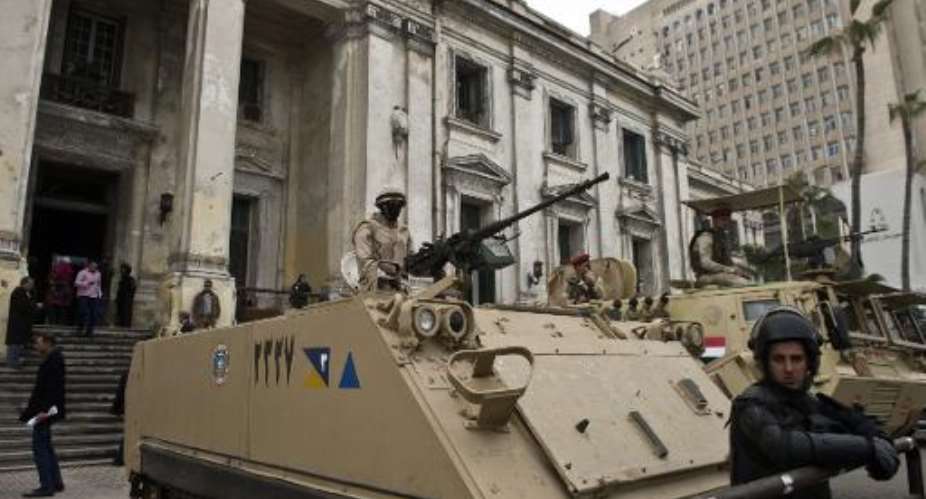Cairo (AFP) - Egyptian President Abdel Fattah al-Sisi on Monday enacted a decree allowing military trials for civilians suspected of attacking state infrastructure, after a string of deadly attacks on soldiers.
The decree came after Sisi promised a tough response to what he called an "existential threat" to Egypt posed by militants, following an attack Friday on an army checkpoint in the Sinai that killed at least 30 soldiers.
It places state infrastructure including electricity towers, major thoroughfares and bridges under military protection for two years, allowing the army to try anyone suspected of attacking the public facilities.
"Crimes against public institutions, facilities and properties fall under the jurisdiction of the military judiciary," the decree states.
Egypt has witnessed a surge in militant attacks since the army, then led by Sisi, ousted Islamist president Mohamed Morsi from power in July 2013.
Morsi's ouster also unleashed a deadly police crackdown on his supporters that has left hundreds dead and thousands in jail.
The government has cracked down on protests after Morsi's overthrow, passing a law that banned all but police-sanctioned demonstrations.
The military was already empowered with trying civilians for attacks on the army, but Sisi's decree considerably expands its powers by defining state infrastructure as "military facilities."
Sisi's spokesman, Alaa Youssef, told AFP the decree was not meant to target protests but would deal only with "terrorism".
"There is a big difference between attacking public installations and protesting," he said. "They are two different things."
The law, he said, was aimed at "protecting public installations and utilities from terrorist attacks."
Rights groups say military trials can carry swift and harsh verdicts.
An end to civilians appearing before military tribunals was a core demand of the revolutionaries who spearheaded a 2011 uprising that overthrew veteran strongman Hosni Mubarak.
Following Mubarak's ouster, thousands of people accused of a range of crimes were tried before military courts during an army-led transition before Morsi's election in mid-2012.





 Former Kotoko Player George Asare elected SRC President at PUG Law Faculty
Former Kotoko Player George Asare elected SRC President at PUG Law Faculty
 2024 elections: Consider ‘dumsor’ when casting your votes; NPP deserves less — P...
2024 elections: Consider ‘dumsor’ when casting your votes; NPP deserves less — P...
 You have no grounds to call Mahama incompetent; you’ve failed — Prof. Marfo blas...
You have no grounds to call Mahama incompetent; you’ve failed — Prof. Marfo blas...
 2024 elections: NPP creates better policies for people like us; we’ll vote for B...
2024 elections: NPP creates better policies for people like us; we’ll vote for B...
 Don’t exchange your life for wealth; a sparkle of fire can be your end — Gender ...
Don’t exchange your life for wealth; a sparkle of fire can be your end — Gender ...
 Ghana’s newly installed Poland train reportedly involved in accident while on a ...
Ghana’s newly installed Poland train reportedly involved in accident while on a ...
 Chieftaincy disputes: Government imposes 4pm to 7am curfew on Sampa township
Chieftaincy disputes: Government imposes 4pm to 7am curfew on Sampa township
 Franklin Cudjoe fumes at unaccountable wasteful executive living large at the ex...
Franklin Cudjoe fumes at unaccountable wasteful executive living large at the ex...
 I'll 'stoop too low' for votes; I'm never moved by your propaganda — Oquaye Jnr ...
I'll 'stoop too low' for votes; I'm never moved by your propaganda — Oquaye Jnr ...
 Kumasi Thermal Plant commissioning: I pray God opens the eyes of leaders who don...
Kumasi Thermal Plant commissioning: I pray God opens the eyes of leaders who don...
